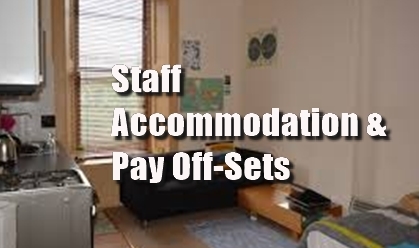Why provide staff accommodation?
Many hoteliers, restaurant and pub operators provide staff accommodation because it is a factor in attracting and retaining staff. For example, there has been a huge increase in the numbers of Europeans working in the hospitality sector in the UK and for many of them the offer of accommodation is crucial if they are to be able to come to the UK and start work quickly. In addition when staff live on site it is easier to manage changing shift patterns, and if weather is bad or travel is difficult staff are on site; and if you don’t live on-site their presence can be essential to keeping your business operating… after all who really likes a 7.30 am brewery drop?
How much do you charge for a room?
Providing staff accommodation represents a cost for a business and many operators try to cover at least some of this cost by charging staff rent. However, it is crucial to make sure that staff who are paying for accommodation (offset against their pay) are still receiving the National Minimum Wage (NMW).
Accommodation Offset – how does it affect the National Minimum Wage?
HMRC carry out regular and unannounced inspections of businesses to ensure they are complying with their obligations to pay the national minimum wage to staff. One area where there is a high risk of non-compliance is the application of the accommodation offset.
Every worker is entitled to be paid the NMW by his employer. The current rates can be found here.
Getting the calculation right
The question is, does accommodation that is provided count towards the hourly rate? In short, it depends how much you charge for the accommodation.
The accommodation offset rate is currently £7.00 per day or £49.00 per week and in some circumstances this can be added to a worker’s pay and will count towards the NMW.
You need to work out the worker’s pay period which could be weekly, monthly or irregular and then calculate their hourly rate after any accommodation charges.
If accommodation is provided Free of Charge:
You can add the accommodation offset to the workers pay.
Example – Gary who is over 21 gets paid £7.00 per hour which is below the National Living Wage (the NMW rate for those over 21). However, he is provided with accommodation free of charge.
Pay period – weekly (every 7 days). He works 30 hours per week.
Pay over 7 days – £7.00 x 30 = £210.00
PLUS
Accommodation offset x 7 days = £49.00
Total = £259.00
Hourly rate over 7 days = £259.00, divided by 30 hours, means Gary’s hourly rate is £8.30 which is more than the National Living Wage.
If accommodation is charged at below the offset rate:
If an employer charges say £30 per week for accommodation then as this is below the offset rate so no offset rate is applied and the accommodation charge does not affect the employee’s pay.
If accommodation is charged above the offset rate:
If an employer charges more than the offset rate for accommodation then the extra charge is taken off the worker’s pay that counts for the NMW. Please note a worker who appears to be earning more than the NMW may not be once the accommodation charges are taken off and this is how many in the leisure sector fall foul of the NMW regulations.
Example – John, aged 27, earns £9.00 per hour which is above the NMW. He pays £8.00 per day for accommodation.
John works a 40 hour week. Pay – £9.00 x 40 = £360 per week
Accommodation rate £8.00 x 7 =£56.00 per week
Offset rate £7.00 x 7 =£49.00 per week
Difference between actual cost of accommodation and offset = £56.00 – £49.00 = £7.00.
Pay less cost of accommodation £280-£7.00 = £273.00
Pay (after accommodation) £273.00 divided by hours in pay period 40 =£6.83 per hour which is below the NMW, leaving the employer open to complaint and prosecution. A maximum fine of £20,000 per worker can be imposed and company directors can be barred from running companies for up to 15 years.
Points to note
- It doesn’t matter whether you deduct the cost of accommodation from the worker’s wages or if s/he pays for accommodation after they get paid – the rules are the same.
- Rent, gas and electricity and laundry all count as accommodation charges.
